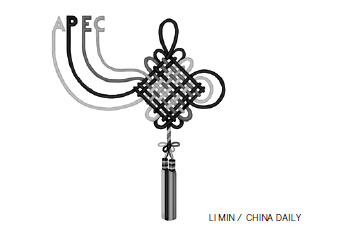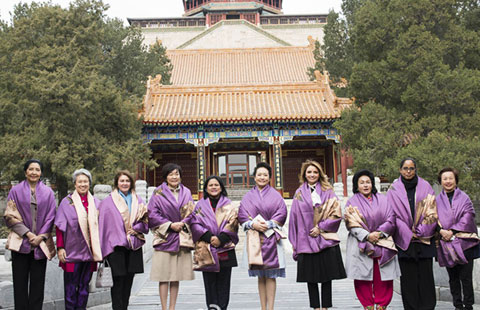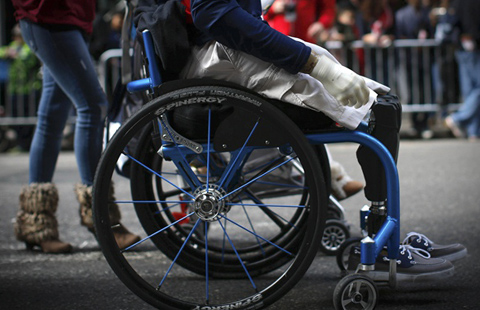Free Asia-Pacific from Western hold
Updated: 2014-11-13 08:02
By Thorsten Pattberg(China Daily USA)
|
||||||||
Asia-Pacific Economic Cooperation is meant to liberalize many profitable fields: free trade, innovative growth, and land and sea connectivity. This is fine. But it should also usher in a new Asia-Pacific culture, and here is why:
APEC has 21 economically, geographically and culturally diverse members, which account for about 40 percent of the world's population, 44 percent of global trade and 55 percent of world GDP. Yet its cultural baggage is 100 percent Anglo-European. This needs to change.
When Mark Zuckerberg, one of the co-founders of Facebook, spoke in Chinese to a group of students at Tsinghua University on Oct 22, he was cheered by China's media. For more than 300 years, the Europe-centric (or West-centric) world has categorically omitted, suppressed and excluded Chinese words, ideas and names from world history, and here was a Western celebrity who broke the spell.
True, Zuckerberg's Facebook is not available in China for the time being for reasons of national security. Beijing simply cannot trust Washington not to use US companies for geopolitical ends, as seen in Germany and Japan which have turned into US satellite states, literally. But China has its own world-class services such as Tencent's QQ and Sina's Weibo, a popular microblogging service in China.
If US President Barack Obama really meant what he said on Nov 6, that Sino-US relations will determine the future (of the world), the West-centric way of thinking has to be abandoned.
First, US publishers, editors and journalists will have to learn and adapt Chinese key terminologies like zhongguomeng (Chinese Dream) and tianxia (under heaven), just like Asians before adopted Western terms such as "philosophers", "the arts" and "pizza". It's simple reciprocity. Translation, an archaic way of silencing, marginalizing or disowning other people's originality, must come to an end.
This is especially true for Western pseudo-global publications, such as The New York Times, The Wall Street Journal, The Economist, Bloomberg and Science magazine, which are constantly censoring China (and all other non-Western countries), guided by outdated Orwellian rules of writing and the racist notion that their papers must be clean of foreign pollution.
Next is the West's China scholarship, which is basically China-free. This is the 21st century, yet Western scholars are happy to keep it colonial, describing Confucianism, Taoism and Buddhism in Greco-Hellenic or Judeo-Christian terms.
Then there are Western politicians, business leaders and diplomats. They should do their homework. East-Asian family names precede given names, hence Xi Jinping and Mao Zedong. What, you knew that? Why not apply it when referring to Chinese people?
Last, writers, artists and innovators, do not shun Asian words. They are your intellectual property. Sadly, Asia never cared, with the unenviable consequence being that today Zuckerberg's brand Facebook enjoys more copyright and legal protection than the entire intellectual output of China in the last 3,000 years.
Leaders and delegates attending the APEC conference must have tasted Oolong tea, Tsingdao beer and, perhaps, Moutai liquor. They must have been addressed as dajia (the great family). And they might have been informed that Tsinghua University is just a Western handle, so that foreigners can find its address. Its correct name is "Qinghua daxue", a place that cultivates perfect gentlemanthe junzi.
Which leads us to Chinese statecraft. Politics is part of culture, and thus differs from one place to another. China, like all other nations, has a unique history. Americans like to brag about theirs. But Beijing has been the center of China for 840 years, long before the United States even existed. China is simply the greater phenomenon, and it is the Americans who will have to adjust more to the Asia-Pacific century.
Many Western people feel intimidated by China for reasons that are not its GDP. Beijing has more than 20 million residents, close to a third of Great Britain's population. The entire city and four neighboring provinces stopped all construction work for days just to ensure APEC delegates get to enjoy clean air. And to make the distinguished guests' life more comfortable, Beijing has also built new hotels, a conference center and a museum village.
Westerners would never do that for Asians.
But still, many white journalists get irritated by China's generosity, feel patronized and then set out to find flaws and shortcomings elsewhere in the city. There, they find the "China experts", Westerners, mostly male and "illiterate", who often have no other skills than speaking their mother tongue. Having unrealistic goals and an old-fashioned sense of privilege and entitlement, they radicalize quickly. So, not only China but also all East Asian economies must find ways to better integrate Western immigrants and provide them with meaningful opportunities.
Which brings us back to the Asia-Pacific century. And to make the Asia-Pacific century work, we would first have to liberalize it from the European one.
The author is a German writer, linguist and cultural critic, and has books such as The East-West Dichotomy, Shengren and Inside Peking University, to his credit.

(China Daily USA 11/13/2014 page13)

 Culture Insider: Chic items in ancient China
Culture Insider: Chic items in ancient China
 Long-term visas issued for China, US citizens
Long-term visas issued for China, US citizens
 The most people dine on the beds
The most people dine on the beds
 Airshow China soars to success in Zhuhai
Airshow China soars to success in Zhuhai
 Xi, Obama agree on major-country ties
Xi, Obama agree on major-country ties
 Wives work to boost cultural exchanges among economies
Wives work to boost cultural exchanges among economies
 Express delivery bursts in Singles' Day
Express delivery bursts in Singles' Day
 Veterans day parade in the US
Veterans day parade in the US
Most Viewed
Editor's Picks

|

|

|

|

|

|
Today's Top News
US-China climate pact to pressure other countries
Express delivery bursts in Singles' Day
Veterans day parade in the US
Visit brings schools closer
Anbang US hotel deal raises queries
A stroll sets stage for diplomacy
Shanghai railway stations use US Wi-Fi technology
Tencent looks to the final travel frontier
US Weekly

|

|







